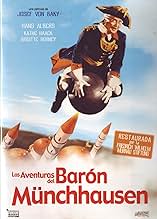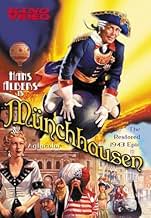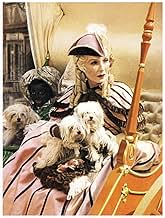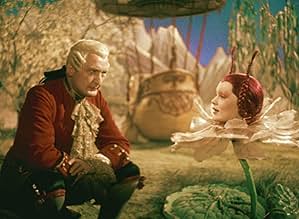Aggiungi una trama nella tua linguaThis lavish, impudent, adult fairy tale takes the viewer from 18th-century Braunschweig to St. Petersburg, Constantinople, Venice, and then to the moon using ingenious special effects, stunn... Leggi tuttoThis lavish, impudent, adult fairy tale takes the viewer from 18th-century Braunschweig to St. Petersburg, Constantinople, Venice, and then to the moon using ingenious special effects, stunning location shooting.This lavish, impudent, adult fairy tale takes the viewer from 18th-century Braunschweig to St. Petersburg, Constantinople, Venice, and then to the moon using ingenious special effects, stunning location shooting.
- Regia
- Sceneggiatura
- Star
- Premi
- 1 candidatura in totale
Recensioni in evidenza
Acclaimed director Terry Gilliam of Monty Python and 12 Monkey's fame, obviously tried to draw more attention to this striking wonder when he made his own version of this tale 'The Adventures Of Baron Munchausen' in 1988. If it wasn't for Mr.Gilliam, I probably would have never bothered to even watch this film. So I owe him many thanks as Münchhausen has easily become one of my all time favorite films. The pace, humour, and sheer originality of this fantasy make it one of the easiest subtitled films to watch in existence, period. It ranks up there with the greatest pre-1950's films such as The Treasure Of The Sierra Madre, and Chaplin's brilliant City Lights. If you love movies, if you love classic cinema, if you love original fantasy films, if you love humorous films; Seek out 1943's Münchhausen whatever you do. It will not disappoint. This film is certainly not for children. However, in terms of flat out fantasy entertainment, I would say that this nearly 70 year old antique blows away Peter Jackson's Lord Of The Rings films any day, and easily. Enough said.
9/10
At the height of World War Two, as the tide was beginning to turn against the Third Reich, Hitler's Minister of Propaganda, Joseph Goebbels commissioned this lavish motion picture as a commemoration of the 25th anniversary of Ufa, the government-run German film association. More importantly, it was also to be a rival of the great fantasy films which had come from the Allied nations, such as THE WIZARD OF OZ (1939) and THE THIEF OF BAGDAD (1940). In that it succeeds brilliantly and needs no comparison to any other film.
The film is a great, lighthearted romp as it follows the adventures of the Baron from Prussia to St. Petersburg, Constantinople, Venice and even the Moon. It is fascinating to see the high quality which the Germans were still able to lavish on the picture, even as their Empire was beginning to crumble around them. The production values are of a very high order and the Technicolor photography is sumptuous to the eye. Remarkably, there is no National Socialist propaganda in the film and the War is never mentioned.
In the title role, Hans Albers gives a surprisingly sensitive performance for such a robust production. He takes the legendary character and gives the viewer a portrait of a dashing, reflective, amorous, compassionate, resourceful man. Whether riding on a cannonball, ingratiating himself with the Ottoman Sultan, or examining the fantastic flora of the lunar planet, Albers always makes Münchhausen totally believable.
All the acting is of a high order, but especially worthy of mention are Ferdinand Marian as the mysterious Count Cagliostro, Brigitte Horney as a flirtatious Catherine the Great, and Gustav Waldau as an aging Casanova.
It should be mentioned that this is not a movie for children. Given its European origins it should come as no surprise that MÜNCHHAUSEN is a good deal more libidinous than the standard Hollywood fare of the time.
**************************
There was a real Baron Karl Friedrich Hieronymus von Münchhausen (1720-1797), a German adventurer and teller of tall tales, but he had nothing to do with the book of fictional exploits which borrowed his name, written by Rudolf Erich Raspe (1737-1794), upon which this film was based.
The Munchhausen Stories in German culture are akin to Jonathan Swift's Gulliver's Travels. The author Rudolf Erich Raspe was trying for Swift like satire of the political events of his time. In time though they became beloved for their face value alone. In fact the protagonist became a synonym, Munchhausen's syndrome is a diagnosis for one who tells exaggerated stories or outright lies the better to ingratiate themselves with another individual or a group.
In fact at the same time that German romantic cinema star Hans Albers was doing Munchhausen over in Germany, a different kind of Munchhausen was popular in America. Jack Pearl, a former vaudevillian, had a radio series based on the Munchhausen character and his famous line to those who questioned the authenticity of his stories was "Vas you dere Charlie". Quite popular back in the day.
The story of the fabled Munchhausen is told in flashback during a party in modern Germany by the current Baron Munchhausen . By the way, another reviewer said that it would be Germany in the Thirties before World War II started. Not necessarily because the Nazi regime was notorious for not asking the kind of sacrifices demanded of its civil population until late in the war. Such a lavish type party was definitely in keeping with the regime's culture of the time.
Though Goebbels kept it light as he did most of UFA's product except those that were outright propaganda, they did get their shots in. During the part of the film concerning Munchhausen's visit to Imperial Russia, the German background of Catherine the Great played by a fetching Brigitte Horney is emphasized. Catherine was a name she took when she married the Czar, she was in fact Sophia of Anhalt-Zerbst. Also there is a scene when Pugachev, the peasant leader of a revolt in Siberia, is brought in caged like an animal and looking like something from Dr. Moreau's laboratory. Pugachev was later played by Van Heflin in the film Tempest in the next decade. The caricature was definitely in keeping with the Nazi ideas to depict Slavic people as some kind of subhumans, almost as bad as Jews.
Throughout the film as Munchhausen travels from St. Petersburg, to Istanbul, to Venice and even the moon, Albers's faithful sidekick is Herman Speelmans who is like Sancho Panza or even Gabby Hayes if you will. Speelmans does a fine job and dies on the moon in a beautifully played scene.
As the propaganda is kept to a minimum, Munchhausen has survived to be appreciated on its own merits which are considerable.
It is filmed in colour and - despite being produced during WWII - no expense had been spared on the lavish sets and costumes. But this is not what this film is all about. As in Gilliam's film, this Münchhausen is a magical character, but it is not the magic you find in a modern animated Walt Disney spectacle, it is a magic with a dark side, a magic that can threaten and seduce and corrupt. Münchhausen himself comes across as an ambiguous character, charismatic and heroic, but by no means cuddly and lovable.
As a result this is more a fairy tale for adults than one for children, and the full original version with nude harem girls, sexual innuendo, etc. wouldn't have passed the American censors of its day and probably still get an R rating today.
Lo sapevi?
- QuizWriter Erich Kästner is widely reported to be billed as "Berthold Bürger" on this film, but there is in fact no writing credit at all. Kästner was a banned author in Nazi Germany and his books were among those burnt in 1933, which was the reason for the lack of writing credit here. Joseph Goebbels gave Kästner only a special permission to write a script, on which the author was actually named as Berthold Bürger. However he also give instruction to the German press never to mention the real author of the script nor to mention the name Berthold Bürger. Therefore no writing credits in the movie was used.
- BlooperSophia's "beauty spots" disappear and reappear during the opening scenes of the film.
- Citazioni
Doge: I'm glad the balloon is to launch in Venice -- it will advance the cause of science, and provide entertainment for the people. The art of the statesman is, by doing one thing, to achieve two goals.
François Blanchard: I serve only science, your Excellency.
Doge: Of course, it's best for you to believe that. Let no one convince you otherwise.
- Versioni alternativeThe length of this film when submitted to the Film Review Office in March 1943, according to the Deutsches Filminstitut, was originally 134 minutes (or 3662 meters). This version was used for the premiere of the film at the Ufa-Palast am Zoo. Three months later, a second version (the general release version) was submitted, cut down to 118 minutes (3225 meters). After the war, the next version (December 1949) was 105 minutes, the 1954 version 101 minutes, the version for general audiences (shown that year) 88 minutes. In 1995, a first restoration was assembled by the F.W. Murnau Foundation, clocking in at 114 minutes. In 2017, a 35mm Agfacolor print was discovered at the Gosfilmofond of Russia. That print, which runs 131m (3590m), was restored and used for the 2019 Blu-ray release.
- ConnessioniFeatured in ...e l'Inghilterra sarà distrutta (1967)
I più visti
- How long is The Adventures of Baron Munchausen?Powered by Alexa
Dettagli
- Data di uscita
- Paese di origine
- Lingua
- Celebre anche come
- The Adventures of Baron Munchausen
- Luoghi delle riprese
- Berlino, Germania(environs)
- Azienda produttrice
- Vedi altri crediti dell’azienda su IMDbPro
- Tempo di esecuzione1 ora 50 minuti
- Mix di suoni
- Proporzioni
- 1.37 : 1
Contribuisci a questa pagina


































